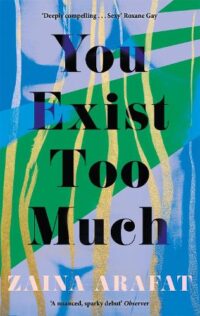Book review: You Exist Too Much by Zaina Arafat
 Like the best literary novels, You Exist Too Much by Zaina Arafat encompasses several big topics in what might seem like a simple, quiet story. I saw this book recommended on several social-media posts about Palestinian books and it is to some extent about being Palestinian, but much more too.
Like the best literary novels, You Exist Too Much by Zaina Arafat encompasses several big topics in what might seem like a simple, quiet story. I saw this book recommended on several social-media posts about Palestinian books and it is to some extent about being Palestinian, but much more too.
Arafat, like her main character, is Palestinian-American and grew up between the US and the Middle East. Her unnamed narrator has for years struggled to reconcile her queerness with her mother’s conservative values. Now she is finally in her first serious relationship with Anna, even living together in New York City, she feels ready to tell her mother she is bi. She is not close to her mother but does speak to her every day, so this is a big step. One that she has been avoiding for years. But she finds herself sabotaging what she and Anna have by obsessing over a potential new love interest.
“The notion that everyone will eventually cease to exist brings me great comfort and temporary courage. Often I try to visualize the coming apocalypse: barren tree branches, scrap metal, tumbleweed. As the images appear in my head, a wave begins to curl in my stomach. Together they propel me forward, and I act.”
Recognising this as a pattern, the narrator checks herself into a rehab for love addiction. Over the weeks of intense therapy, she is forced to interrogate not only her romantic past, but also her upbringing with its long summers visiting family in Palestine and neighbouring countries.
She begins to understand her mother a little better, starting from the influence of her early life, living under occupation and in refugee camps. Her own experiences of visiting Palestine are infused with both dread and joy – the fear of Israeli soldiers and unfamiliar local customs; the pleasure of seeing her mother’s happiness at being home, with her family.
These experiences are perhaps unique to the Palestinian diaspora – though no doubt other children of refugees can relate to some of it. But the narrator is also a modern American woman in her mid 20s thinking about a career, and love, and stability.
She also belatedly recognizes the volatile nature of her parents’ marriage – and that it was not all her mother’s fault. Her father was cold and emotionally absent. She now remembers her mother’s warnings that her father hated women, and her father’s warnings that her outbursts of teenage rage meant she was turning into her mother. Which is all very relatably dysfunctional.
“If my mother was Hamas – unpredictable, impulsive, and frustrated at being stifled – my father was Israel. He’d refuse to meet her most basic needs until she exploded. Then he would point at her and cry, ‘Look at what a monster she is, what a terror!’ But never once did he consider why she had resorted to such extreme tactics, or his role in the matter.”
One small content warning: the narrator and Anna met at an eating disorders clinic, so there is some discussion of living with an eating disorder. But the narrator concentrates on the emotional side, not the actual behaviours.
For a novel that’s largely about therapy, this is a very readable book. And despite it being primarily set in the US, it did also deepen my knowledge of Palestine (as I’d hoped it would). Read Palestinian authors folks! I have several on my TBR now and even more on my wishlist. It might only materially help one Palestinian person, but it gives me a better understanding of Palestine and that cannot be a bad thing.
Published 2020 by Dialogue Books.
Source: The Feminist Bookshop